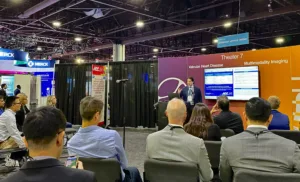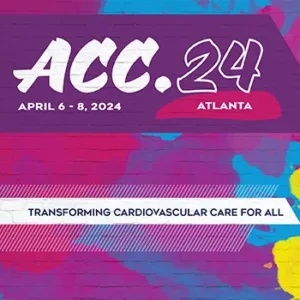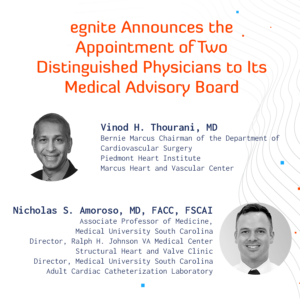Interventional Cardiologist and AI Innovator, Dr. Rahul Sharma reveals how the CardioCare platform, an AI-driven platform designed by egnite, improves efficiency and patient care…
AIMed AI Champions – Tuesday, July 6th , 2021
“For a long time, I’ve been thinking about why we’re not using some of the technologies that have emerged as a result of rapid digital transformations to improve healthcare,” says Dr. Rahul P. Sharma, Director of Structural Interventions at Stanford Healthcare and Clinical Assistant Professor of Medicine at Stanford University. “When I first arrived at Stanford, just over two years ago, to lead the transcatheter heart valve program, I noticed many academic health institutions were experiencing significant inefficiencies in patient care delivery. Being in the heart of Silicon Valley, I was surrounded by many cutting-edge innovations, and it’s ironic many of them have not reached healthcare.”
Gradually, Dr. Sharma realized the problem did not lie in technology itself but in a general lack of understanding of what these technologies can do. “Even a hot term like AI is often used loosely and interchangeably with machine learning, deep learning, natural language processing,” he adds. “Not many know it encompasses different entities sitting within one another.
“I wanted to change that kind of mentality as much as I wanted a ‘smart assistant’ to improve the quality and efficiency of my work,” he says. “I also wanted to minimize the existing manual processes that are reliant on nursing staff, Excel spreadsheets, and in-person checks and balances. I also needed a way to quickly identify, from echocardiograms, patients who may benefit from early assessment, diagnosis, and intervention so that we didn’t have to wait until they are referred for appointments.”
Dr. Sharma conveyed his thoughts to a clinical representative and was recommended to adopt the CardioCare platform, an AI-driven platform designed by egnite. “I deliberately use the word ‘platform’ rather than ‘program’ because this is what cardiac care needs. I don’t need more programs on data mining and organization, but I need a framework to track the journey of patients from diagnosis to treatment. That’s critical.”
Dr. Sharma explains that assistance provided by the CardioCare platform is three-fold. Primarily, it assesses the quality of data objectively and allows comparison to national averages and accepted clinical guidelines, to standardize the quality of care and to treat patients earlier. Next, CardioCare automates and improves efficiency in the recruitment of patients potentially eligible for clinical trials. All researchers need to do is to select the variables of interest and the CardioCare platform will provide a highly refined group of patients whom they can review for potential eligibility in clinical trials.
More importantly, CardioCare has expanded Stanford’s therapy awareness effort. CardioCare would help health care professionals identify patients with certain pathologies and enable the specialists to prioritize the review of patients requiring follow-up. The specialists are then able to reach out to the patients’ primary care physicians and offer to assist at a more comprehensive and multi-disciplinary clinic. Without CardioCare, Dr. Sharma believes the Stanford team would not be able to have those patients in their sights and expand the therapy options to referral regions that they serve.
However, Dr. Sharma adds that one should not take CardioCare’s capabilities for granted; “I am fortunate as I am not only a healthcare provider that is using this platform, but I also work closely with the company, particularly their engineers, to help with CardioCare’s iteration and development. I think the key distinction between a good and not so good healthcare solution lies in whether the technology can mimic various elements of human intelligence. It’s not just about the ability to process data and make predictions but how these technologies are integrated into clinical practice to help providers make more informed and timely decisions about patient care.”
CardioCare is now connected to electronic medical records giving users access to patients’ entire medical history. “This broadens our ability to look at more cardiovascular disease states,” says Dr. Sharma. “In the future, we will be looking to target patients with atrial fibrillation who are at risk for stroke but also high risk for bleeding, who may be candidates for other protective transcatheter therapy options. If we wait for physicians to think about the referral and get patients’ feedback on the decision, many treatable patients may get referred too late. CardioCare is bridging that gap for us.
“I am excited about how AI can reduce redundancies and inefficiencies in the healthcare system, and it will be interesting when we look back one day and compare what our practice was like before and after CardioCare,” he adds. “I would ask clinicians, what’s their understanding of AI in their practice? I think everyone should have a basic understanding of what AI is. Ultimately, they should be willing to do something about the results generated by AI. There will not be a tangible benefit if an algorithm informs us of something and we are not acting on it.”
Read the original article here.
CardioCare is a trademark of egnite, Inc. All other trademarks are property of their respective owners.



